Imperator: Rome review: I conquered, I conquered, I conquered - fierrobitherry
In the yr 489ab urbe condita, or 489 days after the founding of Roma, General Quintus Marcia Philippus achieved his life ambition. Having led Rome's legions for nearly four decades, he stood on a beach furthest from home and watched as Rome's legions marched through the streets of Syracuse, the triumphant end to a nearly two-year siege. It was a major milestone for the growing Republic, once a loose agglomerative of provinces, now a unified state that extended from modern-day Tuscany northwar to Sicilia in the south. A single lifetime had witnessed the elimination or desegregation of the Etruscans, the Samnites, the Sabines, the Syracusans, wholly Rome's old rivals.
Of course, what Quintus Marcia Philippus didn't know in this bit of gloat is that Capital of Italy's coffers put across blank and its legions could no more find the men needed for reinforcements—and just eventually to draw the eye of Carthage from across the Sea.
I could rely I heard King Pyrrhus laughing from across the Adriatic.
Morituri te salutant
Rome wasn't built in a day—nor, arsenic I've discovered, was it built in a week. I've worn out about that womb-to-tomb actingImperator: Rome, and still don't feel quite an prepared to bang a nock on that. Like nearly of Paradox's grand strategy games, IT's a formidable undertaking, meant to duplicate the rise (and dusk) of the Roman Republic from approximately 304 BCE to around 27 BCE.
I haven't made it that far, in part because I keep down starting over. I've splattered, spending time as Stargazer Egypt, Eastern Samoa a Germanic tribe, as Carthage, and in a few of Alexander the Great's heir states.
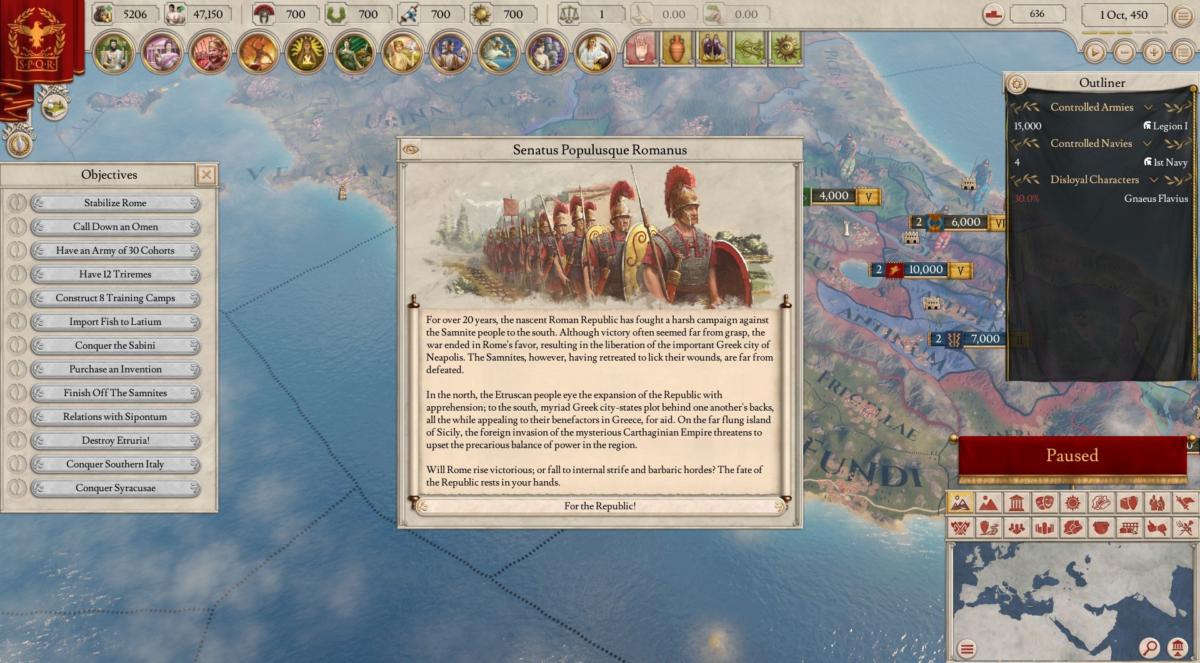 IDG / Hayden Dingman
IDG / Hayden Dingman More often than not I've played as Rome, though. IT's clearly the focus, and why not? After completely, the brave's titledImperator: Rome. The tutorial steers you right down that way of life, guiding you through a pseudo-historical reenactment of Capital of Italy's rise, first subjection the Sabines, then the Samnites, the Etruscans, and so on until you've condemned Syracuse and become a major power.
On the way you apparently learn to the highest degree ofImperator: Rome's systems: how to raise armies, apply churchly omens to pad various stats, navigate elemental diplomacy and use IT to wage war on your neighbors, establish trade routes, and so on.
It's a lot of information. Information technology's also zero. In standard Paradox fashion, finish the tutorial leaves you barely better off than when you started. It's a flake like flying a spaceship to the moon after reading a Book about the Wright brothers.Imperator is pretty good at teaching youhow to jam its buttons, not and so so muchwhy you should press them, and just as a Paradox vet there were (and still are) aspects that confused ME.
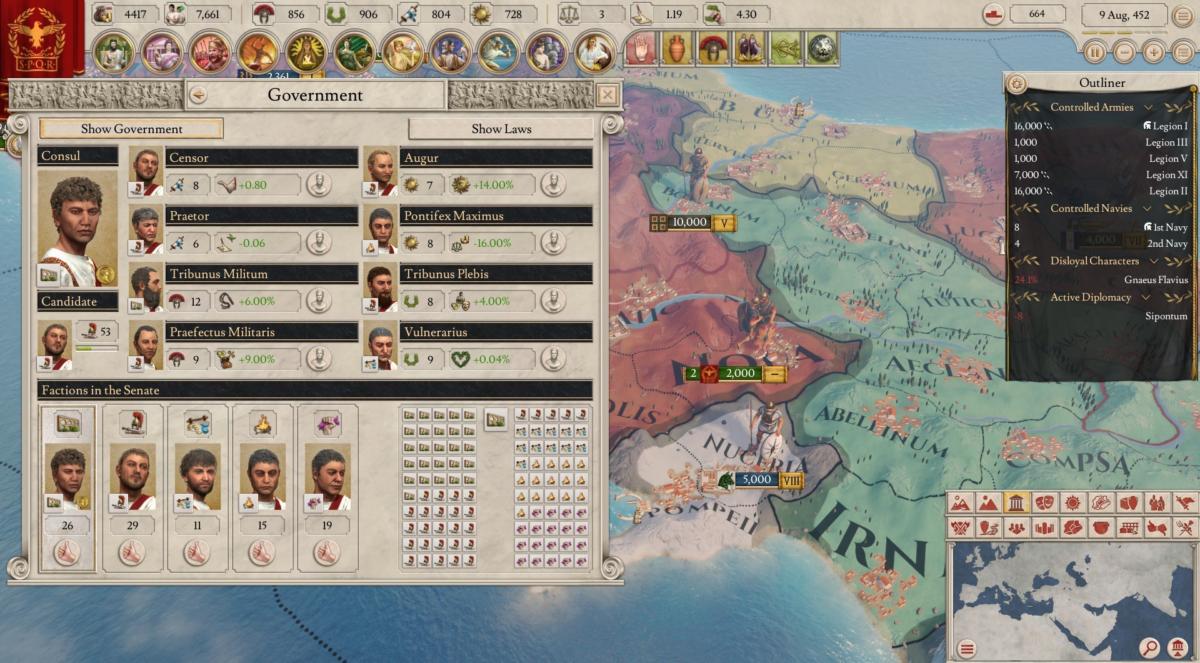 IDG / Hayden Dingman
IDG / Hayden Dingman The interface is a significant division of the problem. That's my first major complaint withImperator. It's ill-favoured, for starters, simply that could be forgiven if it were useful. Sol more of the information you neediness is interred three or four menus deep, OR not comprehensible at all, or accessible only if you zoom out far-off decent, operating theater contextually if you click happening an regular army first, and so along etcetera. IT's a mess, and makes the already steep erudition curve harsher than it necessarily to be.
Admittedly,Imperator falls victim to its own ambitions. Connected a geographic level, for instance you suffer thousands of cities unreal in hundreds of provinces, controlled by dozens of factions. Each city past has pops, an idea lifted from Paradox'sVictoria Falls II, wherein the population is represented away different castes. Hera, that means slaves, tribesmen, freemen, and citizens. Each tier of kill comes with different benefits—slaves generate income, citizens inquiry, et cetera.
Pops are thenfurther broken aweigh by cultureand religion, so you can induce a Roman-limited metropolis with mostly druidic slaves, Individual freemen, and a mix of Grecian citizens that come from Rome, Macedonia, and Etruria. Needless to say, the conquered are seldom happy to live under the conquerors.
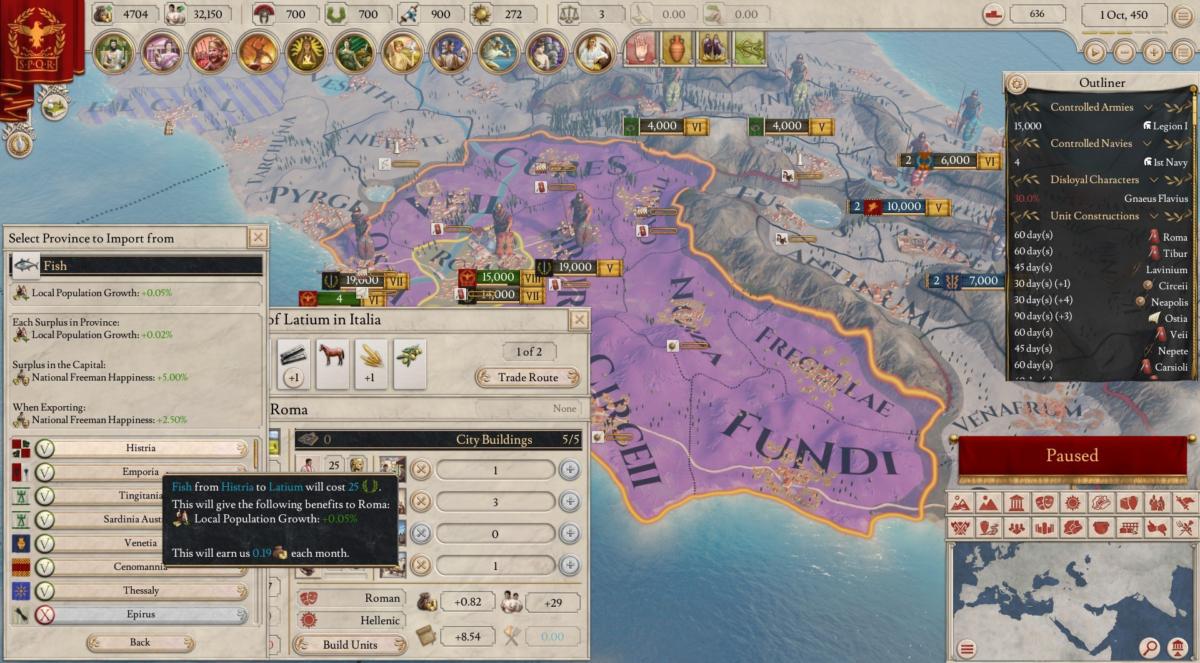 IDG / Hayden Dingman
IDG / Hayden Dingman It's exhausting, and the best results take managing these pops individually, city-aside-city, assimilatory foreign influences or promoting pops from one tier to another to keep your resource balance integral. And that's just one system among umteen.
Imperatorhas so much going on, the task of elegantly representing entirely this information seems infernal near impossible. Paradox has successful an extra effort to improve its tutorials and its interfaces in recent years, and done a good job at information technology!Europa Universalis Quatern ironed much of rough edges offCrusader Kings II, andStellaris did even more to make this once-impenetrable writing style look approachable. So approachable, in fact, that Paradox made a more-than-clean console rendering ofStellaris.
ButImperatorborrows elements from the whole of Paradox's card—characters fromCrusader Kings II, the aforesaid universe mechanics fromVictoria Deuce, field ideas fromBlack Maria of Iron, trade in and diplomatic negotiations fromEuropa Universalis. It's sprawling and complex andpalatial.
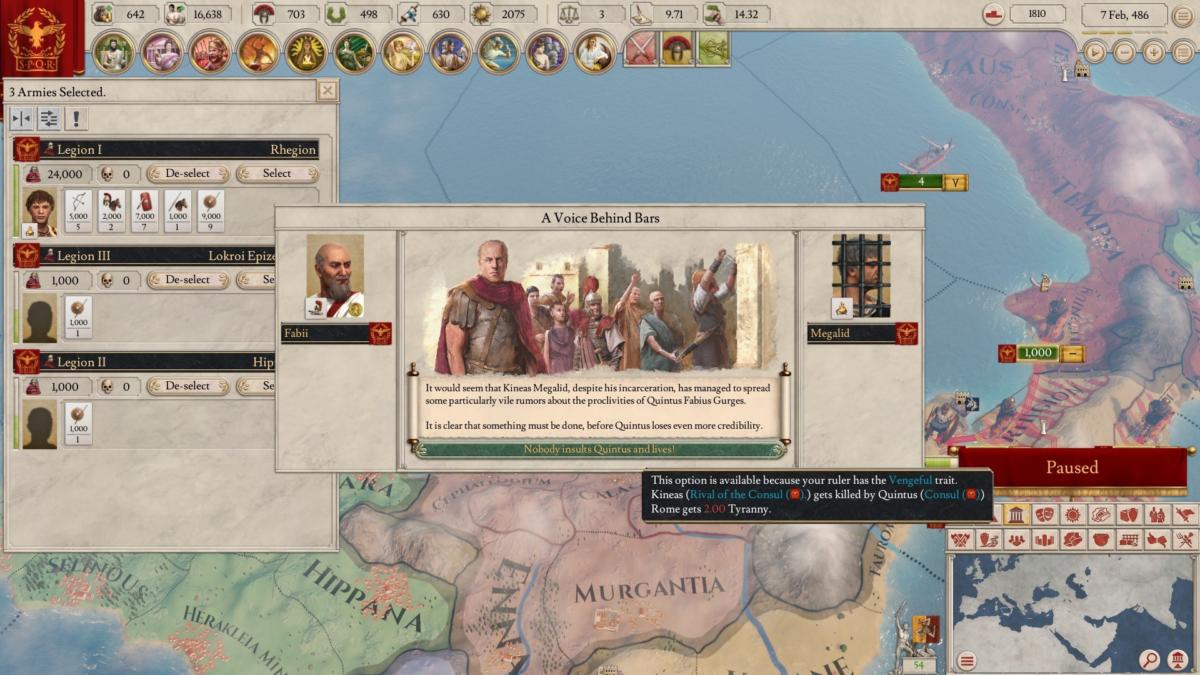 IDG / Hayden Dingman
IDG / Hayden Dingman When the pieces close, it john even storm you. There's a neat era-specialized army mechanic, for exemplify that over time sees troops transfer their loyalty from the res publica to their general. Give a favorite and pushful general too some military personnel and he's liable to start a polite war, a neat way of simulating your very own intersection-the-Rubicon moment. Ideas like this helpImperator smooth and reveal its inactive potency.
Sol much of it is interred, though. There are somany systems, each dependent on factors from stillmore systems, dozens of calculations spurting in the background. Trying to class out what's important in this tooltip-laden interface is a lost cause.
Worse, many of these systems feel for sketched in, superfluous. I chance Paradox's war-centric games less engaging aside default, but even out soImperator feels thin. Information technology's par for the run over with Paradox, andImperator is but a framework destined to be fleshed out away many a years of post-release content. That doesn't give the present reality any more substance, though.
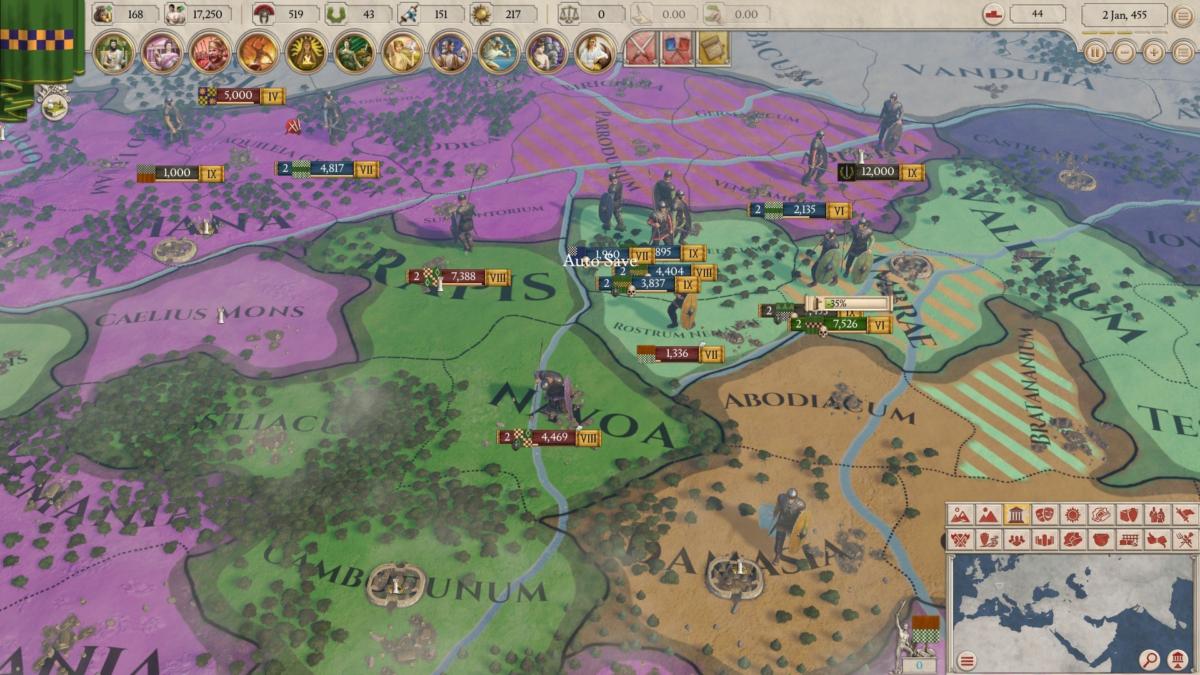 IDG / Hayden Dingman
IDG / Hayden Dingman Thus the military angle is more varying thanEuropa Universalis IV at release, with around a dozen different types of troops—including niche units like camels and elephants, plus the usual heavy infantry, skirmishers, archers, and historically significant types like horse archers. Large, just it's still a fraction of the complexity inHearts of Iron IV.
And characters are a neat theme, especially for a Roman-earned run average game. The "Great Man Theory" has mostly fallen out of fashion in historian circles, but such of Roman Catholic history is (often by necessity) inextricably linked to these larger-than-life figures—Gaius Julius Caesar, Pompey, Sulla, Marius, and even foes of Roma look-alike Hannibal and Pyrrhus.
Paradox was quick to care before release that this was noCrusader Kings II though, and so it is not. There are rivalries and friendships, prisoners and gladiatorial battle, governors and consuls and praetors and every personal manner of government positions for your significant citizens to ask. But none of information technology seems to matter much, and none of them rich person such to perform. Staving off a civic warfare is middling easy if you watch disloyal characters, at least as Interahamw as I've played, and otherwise you can mostly Lashkar-e-Tayyiba the Senate run itself.
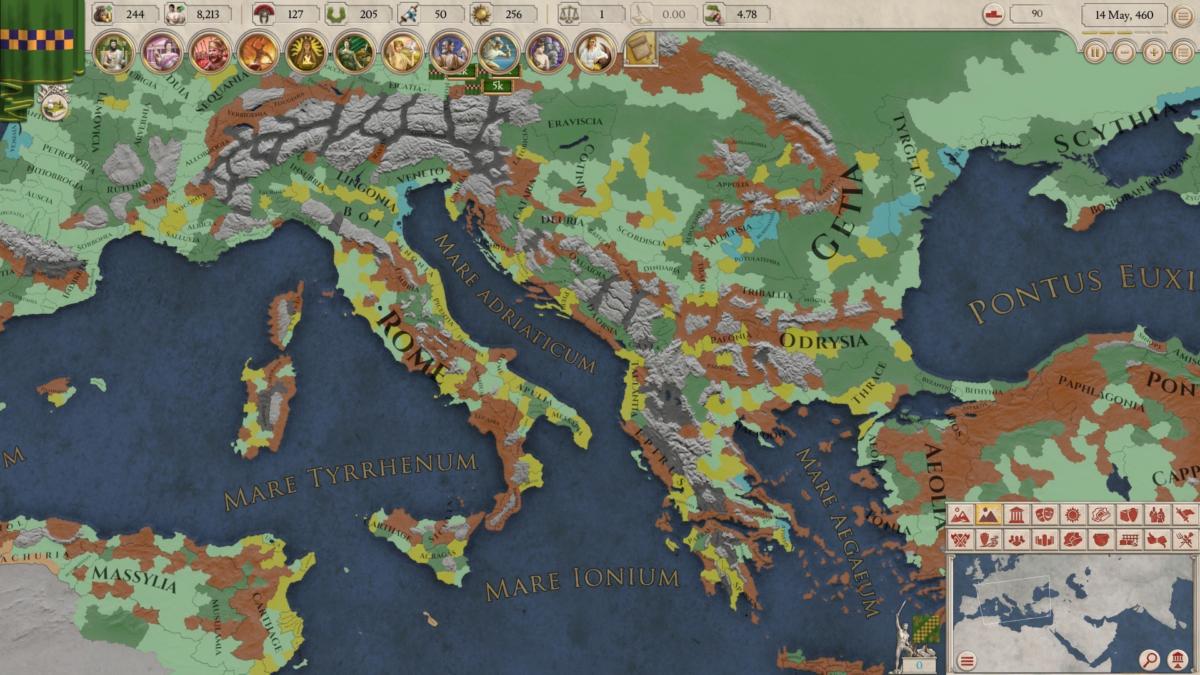 IDG / Hayden Dingman
IDG / Hayden Dingman You throne create a more civic-minded Eternal City or a patronage-focused Rome, but at the goal of the day this is a game about warfare and…that's kind of it. It's non about role-playing the inner workings of Rome's political machine. It's nigh making true you can conquer Carthage and play the map to Italian red.
It's fairly successful in that pursuit, but even then in that respect's not much motivation to prosper beyond "I came, I saw, I conquered." You're building an empire because that's whatImperator's tools enable, and the rest—the population mechanism, the characters, the incomplete tech trees and religious ideas—are tired service of that goal. And that's a shame, because so galore of those ideas could lead to marvelous games in their own right.
Maybe they will. Once again, that's the interrogation with any newly discharged Paradox game. Maybe we'll get that part-centric enlargement one day, if enough people clamor for it. Or maybe we'll interpret the churchgoing game given new depth. Maybe we'll see both, and it'll coincide with the timeline expanding into the Roman Empire period.
 IDG / Hayden Dingman
IDG / Hayden Dingman Anything is possible, and indeed a good deal of aspects are conspicuously thin, tempting the player to replete in the blanks. As I mentioned earlier for case, it's frank Rome's been given the well-nig attention early happening. Factions mystify less and less discernible, the lower they are in importance. Carthage and Egypt are pretty firm, Alexander's replacement states are passable, tribes are just worth playing and exist mostly to squabble among themselves until mortal comes along and conquers them.
Diplomacy is simplistic and oddly formal, requiring, for example, that you make up a arrogate on any territory you plan to conquer—even when that makes no sense, as in Roma's wars in Gaul, or when sending tribes against one another. Again, it seems like an obvious "Expect for an expansion" window, when Thomas More special circumstances will be added.
Hell, we were even advised of one of these forthcoming updates ahead release. Service warfare is basically nonexistent at the moment, but Paradox has a sizeable patch planned for June that volition add new flavor events and break ship battles the corresponding depth as kingdom battles.
Bottom line
All this to say: It has potential.Imperator: Eternal City attempts to wrangle Paradox's entire bequest into a single across-the-board game. It hasn't got there, not yet, but I know ITcan get there—and probably leave, given Paradox's track record. It's just a matter of when.
I look gardant to that day though. Roman history has long been one of my pet periods, and I'd love for Paradox's simulation to expand enough to immerse myself in it. I want memorable character moments, triumphant sieges and long-running rivalries between world powers, artistic and religious advances that change Roman culture. I neediness an conglomerate, and I want my crazed kids to goldbrick as hundreds of years of history bite to the land. That's the hope ofImperator: Rome, a sprawling large for an epic era. Information technology's no surprise Paradox hasn't captured all that intricacy from the start, but like Rome itself, there's a lot more mental synthesis onwards.
Source: https://www.pcworld.com/article/403635/imperator-rome-review.html
Posted by: fierrobitherry.blogspot.com


0 Response to "Imperator: Rome review: I conquered, I conquered, I conquered - fierrobitherry"
Post a Comment